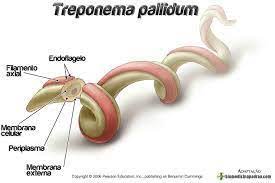Syphilis disease or lion king is a sexually transmitted infection (STI) caused by bacteria. The disease begins as a painless sore, usually on the genitals, rectum or mouth. This condition can be spread from person to person through skin contact or mucus from these sores.
After the initial infection, the syphilis bacteria can be dormant in the body for decades before being active again. If diagnosed quickly, the disease can be cured with antibiotics.
Without treatment, the disease, also known as lion king disease, can damage the heart, brain or other organs, and can be life-threatening. Syphilis can also be passed from a mother to an unborn child.
Causes of Syphilis

The cause of syphilis is a bacterium called Treponema pallidum. The most common way it is spread is through contact with the wounds of an infected person during sexual activity. Bacteria enter the body through small cuts or on the skin or mucus repair.
Syphilis is contagious during the primary and secondary stages, and sometimes early in the latent period. In rarer cases, the condition can be spread by direct contact with an active lesion, such as during kissing. It can also be passed from mother to baby during pregnancy or childbirth.
Syphilis cannot be spread by using the same toilet, bath, clothing or eating utensils, or from doorknobs, swimming pools, or hot tubs.
After recovery, the disease does not return or recur by itself. However, a person can be reinfected if they have contact with a syphilis sore from another person.
Syphilis Risk Factors
Anyone who is sexually active can get syphilis, but some people have an increased risk of infection. The risk will be higher if:
- Being gay, bisexual, or having sex with men.
- have unprotected sex, especially if you have multiple partners.
- Have HIV/AIDS.
- Having sex with someone who has syphilis.
- Have another type of STI, such as chlamydia, gonorrhea or herpes.
Syphilis Symptoms
There are five stages for the symptoms of this disease, namely:
Primary Syphilis
Symptoms of this condition generally appear in the form of sores for 10 to 90 days after the bacteria enter the body. Recovery takes about 3 to 6 weeks.
Secondary Syphilis
Secondary syphilis occurs several weeks after the sores have disappeared, with a rash anywhere on the body, especially the palms and soles.
Coupled with the flu, fatigue, headaches, joint pain, and fever are generally examples of other symptoms experienced by sufferers. Immediately treat secondary syphilis appropriately, so that the infection does not progress to the next stage.
Latent Syphilis
Latent syphilis is asymptomatic, but within the first 12 months, the infection can still be contagious. If not treated, this condition will turn into tertiary.
Tertiary Syphilis
Tertiary syphilis is the most dangerous type. The symptoms experienced will be greatly influenced by which part of the body the syphilis bacteria enter. The tertiary type has an impact on the eyes, heart, brain, blood vessels, bones, joints, and also the liver.
This causes sufferers to experience blindness, heart disease and stroke due to the occurrence of these sexually transmitted diseases.
Congenital Syphilis
If this condition occurs in pregnant women, the woman's fetus can also be infected. The infection can be passed on to the fetus if a mother has syphilis. This risk can be reduced by treating the infection before the gestation period reaches 4 months.
If the handling and treatment is delayed, the pregnant woman will be exposed to complications. The complications in question are babies born prematurely, babies born prematurely, babies born with syphilis, and babies' lives after birth.
Syphilis Diagnosis
To make a diagnosis, your doctor will ask about your sexual history, including whether you practice safe sex. It's important to be honest during this discussion. Because doctors can help assess risk and recommend tests for other STIs.
To confirm the diagnosis, the doctor will examine and take a blood sample to look for signs of infection. The doctor may also remove some fluid or a small piece of skin from the wound and test it in a laboratory.
Syphilis Treatment
For primary and secondary, treatment can be done with antibiotics which are usually carried out for approximately 14 days.
For tertiary syphilis and in pregnant women, the treatment time will be longer and the use of antibiotics given intravenously. People with syphilis will undergo blood tests to ensure that the infection is completely cured, after undergoing antibiotic treatment.
Syphilis Prevention
Ways to avoid this disease, namely:
- Avoid alcohol and illegal drugs.
- Having one regular partner for sexual intercourse.
- Stop having sexual contact for a long time.
- Openly discuss the history of venereal disease experienced with the partner.
- Get used to using condoms when you have to have sex with people you don't know.
When to go to the doctor?
Call your doctor immediately if you experience the symptoms of syphilis described above. Proper handling can minimize the consequences, so that treatment can be carried out more quickly




Check the Notify me box to get notified via email when someone replies to a comment.
URGENT...! Make sure your comments are in the form of questions, corrections, or other similar things that are USEFUL (for you or maybe for other users in the future). Comments that are trite (such as thanks, hopefully useful or something similar) will be deleted